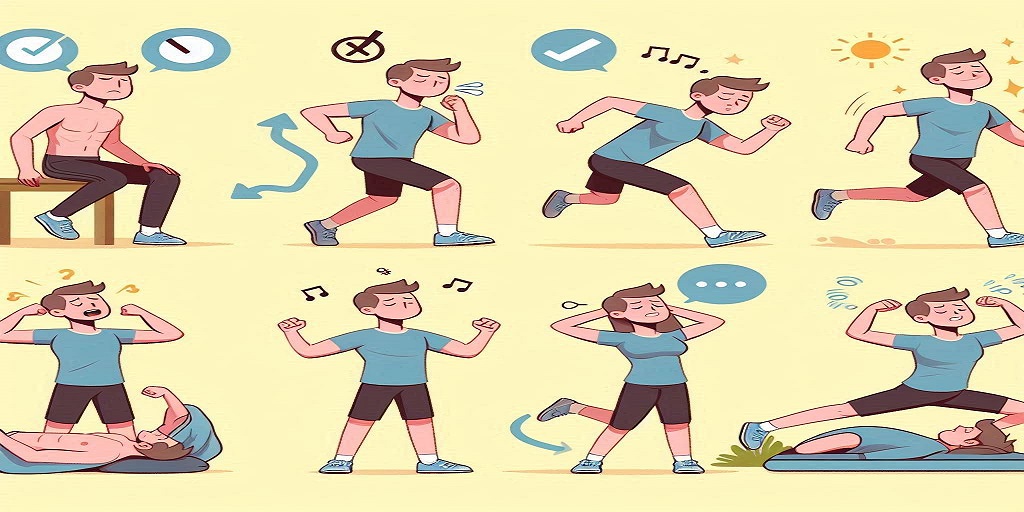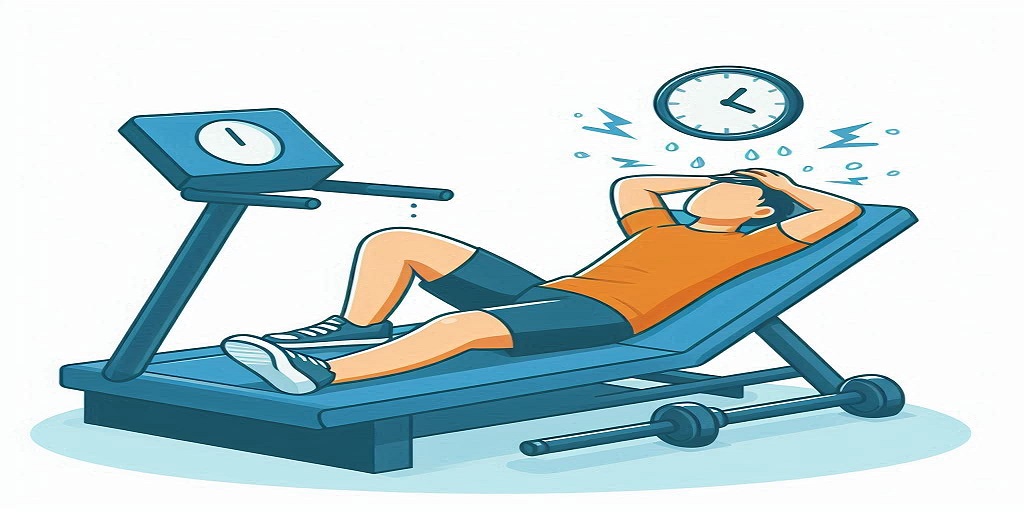Are You Feeling Lazy All the Time? Uncover the Secrets to Mental and Physical Wellness
Do you often find yourself feeling lazy and unmotivated, struggling to get through your day? This persistent lethargy might be more than just a fleeting lack of energy. Chronic laziness can often signal underlying mental health issues. It’s crucial to understand this connection, as it may be the first step towards reclaiming your vitality and overall well-being. When mental health issues go unaddressed, they can manifest as physical symptoms like fatigue and lack of motivation, making it challenging to maintain an active and fulfilling lifestyle.
What is Mental Health, Really?
Mental health encompasses more than just the absence of mental illness. According to the World Health Organization (WHO), it is a state of well-being where individuals can handle life’s stresses, work productively, and contribute to their communities. This concept of mental health is foundational, affecting how we think, feel, and act. It influences our relationships, decisions, and overall quality of life. Good mental health allows us to manage daily challenges effectively and maintain a positive outlook, which can significantly impact our overall happiness and productivity.
Why Mental Well-being is Key to Your Overall Health
Mental well-being is integral to how effectively we function in various aspects of life. It’s not just about feeling good but also about thriving and performing well. Prioritizing mental health can lead to several positive outcomes:
– Boost Your Mood: Effective mental health management enables you to handle emotions and stress better, fostering resilience and inner peace. When your mental health is in good shape, you can enjoy a more positive and stable mood, which can improve your overall outlook on life.
– Enhance Your Physical Health: Good mental health can contribute to physical health by reducing the risk of chronic diseases. It also alleviates physical symptoms such as headaches, muscle tension, and fatigue. Managing stress and mental health issues can lead to a healthier body and a stronger immune system.
– Strengthen Your Relationships: When you prioritize mental well-being, you enhance your communication skills and conflict resolution abilities. This improvement is crucial for maintaining healthy relationships with family, friends, and colleagues, leading to more satisfying and supportive connections.
– Increase Productivity: Mental clarity and motivation are key to better performance in work and daily activities. When your mental health is well-managed, you are more likely to stay focused, meet deadlines, and achieve your goals effectively.
The Intriguing Link Between Physical Fitness and Mental Health
How Exercise Can Transform Your Mood
Exercise is not just a way to stay fit; it is a powerful mood enhancer. Physical activity triggers the release of endorphins, which are natural chemicals that elevate your mood and reduce feelings of pain. This biochemical response can help alleviate symptoms of anxiety and depression, providing a natural high that can last for hours or even days after your workout. Engaging in regular exercise can create a more consistent and balanced mood, helping you feel more energized and motivated throughout your day.

Exercise: Your Secret Weapon Against Stress
Engaging in physical activity helps reduce the levels of stress hormones such as cortisol and stimulates the production of endorphins. These changes promote relaxation and contribute to an overall sense of well-being. Exercise provides a healthy outlet for releasing pent-up energy and emotions, making it an effective strategy for managing stress. Whether it’s a brisk walk, a challenging workout, or a relaxing yoga session, incorporating exercise into your routine can help you cope better with daily stressors.
Long-term Mental Health Benefits of Staying Active
Regular exercise is associated with a lower risk of developing mental health conditions such as depression and anxiety. It also contributes to better sleep quality, which is essential for emotional regulation and mental clarity. Over time, consistent physical activity can lead to improved cognitive function, enhanced mood stability, and a greater sense of overall well-being. By making exercise a regular part of your life, you can enjoy long-term benefits for both your mental and physical health.
Common Mental Health Challenges: The Silent Saboteurs
Stress: The Hidden Enemy
While stress is an unavoidable aspect of life, chronic stress can have a detrimental impact on both mental and physical health. Persistent stress can lead to symptoms such as anxiety, irritability, and sleep disturbances. It can also contribute to physical health problems, including cardiovascular issues and digestive disorders. Understanding the sources of stress and developing effective coping strategies is crucial for maintaining overall health and preventing stress from becoming a significant burden.
Anxiety: The Unseen Burden
Anxiety disorders, ranging from generalized anxiety to specific phobias, affect millions of people worldwide. These disorders are characterized by excessive worry and fear that can interfere with daily functioning. Symptoms may include restlessness, increased heart rate, and difficulty concentrating. Addressing anxiety through therapy, lifestyle changes, and coping techniques can help manage its impact and improve quality of life.

Depression: The Silent Struggle
Depression is more than just a fleeting feeling of sadness; it is a persistent state of hopelessness that can severely impact your daily life. Symptoms of depression may include changes in appetite, disrupted sleep patterns, and difficulties with concentration. This condition can profoundly affect your relationships and overall quality of life. Recognizing the signs of depression and seeking appropriate help is essential for managing the condition and improving well-being.
Cultivating Healthy Habits for a Happier Mind
Nourish Your Brain with a Balanced Diet
Eating a diet rich in fruits, vegetables, whole grains, lean proteins, and healthy fats provides essential nutrients that support brain health. These nutrients can help reduce symptoms of depression, enhance cognitive function, and promote overall mental well-being. A balanced diet can also improve energy levels and mood, contributing to a more positive and focused mindset.
Make Exercise Non-negotiable
Regular physical activity is a cornerstone of mental well-being. It not only improves mood but also helps reduce stress and enhances overall brain health. Incorporating exercise into your routine can lead to long-term benefits, including increased energy, better sleep, and improved mental clarity. Aim to find an activity that you enjoy and make it a regular part of your lifestyle.

Embrace Mindfulness and Meditation
Mindfulness and meditation practices are valuable tools for promoting mental clarity and emotional regulation. These practices can help reduce anxiety, depression, and stress by encouraging you to focus on the present moment. Regular mindfulness and meditation can improve overall mental well-being, enhance self-awareness, and contribute to a more balanced and peaceful state of mind.
Prioritize Quality Sleep
Adequate sleep is essential for maintaining mental health. It helps regulate mood, process emotions, and support cognitive function. Prioritizing quality sleep involves establishing a consistent sleep routine, creating a relaxing bedtime environment, and avoiding factors that can disrupt sleep. Good sleep hygiene is crucial for overall mental well-being and contributes to a more refreshed and balanced mindset.
Mastering Stress in a Fast-paced World
Time Management: Take Control of Your Day
Effective time management is key to reducing feelings of overwhelm and gaining a sense of control over your daily schedule. By organizing tasks, setting priorities, and breaking projects into manageable steps, you can reduce stress and improve productivity. Implementing time management strategies can lead to a more structured and fulfilling routine, helping you navigate the demands of a fast-paced world with greater ease.
Deep Breathing: A Quick Stress Reliever
Deep breathing exercises are a simple yet effective way to activate your body’s relaxation response. By focusing on slow, deep breaths, you can calm your mind and reduce stress. Incorporating deep breathing into your daily routine or using it during stressful moments can help promote relaxation and improve overall mental well-being.
Mindfulness: Stay Present, Stay Calm
Mindfulness practices encourage you to stay present and focus on the current moment. This approach can help reduce worries about the past or future, leading to a calmer and more centered mindset. Regular mindfulness practice can enhance emotional regulation, improve stress management, and contribute to a more balanced and peaceful life.
Regular Physical Activity: Move to Unwind
Physical activity is one of the most effective ways to manage stress. By engaging in regular exercise, you can release built-up tension, boost your mood, and improve overall well-being. Whether it’s a structured workout or a casual walk, incorporating physical activity into your routine can help you unwind and cope with daily stressors more effectively.
The Power of Social Support: You’re Not Alone
Engage in Community Activities
Participating in community activities can foster a sense of belonging and help build meaningful relationships. Being involved in social and community-oriented events provides opportunities for connection, support, and shared experiences. Engaging with others can enhance your social network and contribute to a more fulfilling and connected life.

Communicate Openly
Open and honest communication is essential for building trust and deeper connections with others. Sharing your thoughts and feelings can strengthen relationships and create a supportive network. Effective communication also helps address misunderstandings and resolve conflicts, leading to healthier and more satisfying interactions.
Seek Support When Needed
Don’t hesitate to reach out to friends, family, or mental health professionals when you need help. Recognizing when to seek support is crucial for managing mental health challenges and maintaining overall well-being. Support from loved ones and professionals can provide guidance, encouragement, and practical solutions to navigate difficult times.
Mental Health in the Workplace: Creating a Supportive Environment
Encourage Work-Life Balance
Promoting a healthy work-life balance is essential for preventing burnout and supporting mental well-being. Encouraging employees to balance their professional and personal lives can reduce stress and improve job satisfaction. A supportive work environment that values work-life balance contributes to overall mental health and productivity.
Provide Mental Health Resources
Offering access to counseling services, employee assistance programs, and mental health training can help employees manage stress and mental health challenges. Providing resources and support within the workplace demonstrates a commitment to employee well-being and fosters a positive work culture.
Foster Open Communication
Creating a culture of open communication within the workplace helps reduce stress and build a positive work environment. Encouraging dialogue about mental health and well-being can help address issues early, promote understanding, and support a more inclusive and supportive work culture.
Gadgets and Apps: Modern Tools for Mental Wellness
Wearable Fitness Trackers
Wearable fitness trackers can monitor various health metrics, such as heart rate, sleep patterns, and stress levels. These devices provide valuable insights into your mental and physical well-being, helping you track progress and make informed decisions about your health. By keeping track of these metrics, you can gain a better understanding of your overall wellness and identify areas for improvement.
Mental Health Apps
Mental health apps offer convenient support for managing mental well-being. Features such as mood tracking, guided meditation, and cognitive-behavioral therapy exercises can provide accessible tools for maintaining mental health. Utilizing these apps can help you incorporate mental health practices into your daily routine, providing ongoing support and guidance.
You Can Talk to Us
“You can use our Chat Bot to get professional advice on mental health. Our experts, with extensive experience in the field, are available to support your well-being and provide valuable insights.”
Knowing When to Seek Professional Help
The Benefits of Therapy
Therapy offers a safe and supportive space to explore your thoughts and feelings. It can help you develop effective coping strategies, gain insights into your mental health, and address underlying issues. Working with a therapist can lead to improved emotional well-being and a better understanding of yourself.
Recognize the Signs
Seek professional help if mental health challenges begin to interfere with your daily life, cause significant distress, or affect your relationships. Early intervention is crucial for preventing conditions from worsening and improving overall well-being. Recognizing the signs and seeking appropriate support can lead to better outcomes and a more balanced life.
Integrating Mental Health into Your Wellness Routine
Mental health is a fundamental aspect of overall wellness. By adopting healthy habits, seeking support, and utilizing modern tools, you can build a strong foundation for mental well-being. This comprehensive approach leads to a more balanced and fulfilling life, fostering resilience, meaningful relationships, and the achievement of personal goals. Remember, prioritizing mental health is an ongoing journey that deserves your attention and care. Embracing this journey can lead to a more vibrant, resilient, and fulfilling life.
Sources
1. World Health Organization (WHO). (2023). Mental health: strengthening our response.
2. Harvard T.H. Chan School of Public Health. (2023). Nutrition and mental health.
3. American Psychological Association (APA). (2023). Exercise for mental health.
4. Mayo Clinic. (2023). Exercise and stress: Get moving to manage stress.
5. National Institute of Mental Health (NIMH). (2023). Anxiety disorders.
6. National Institute of Mental Health (NIMH). (2023). Depression.